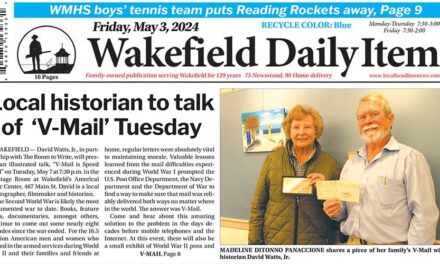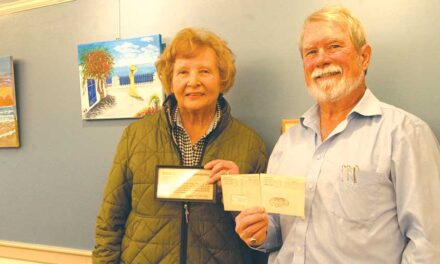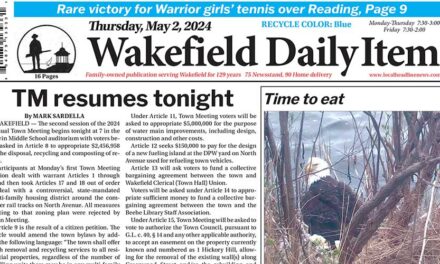Published in the May 4, 2017 edition.
By MARK SARDELLA
WAKEFIELD – In more than one sense, the third and final talk of the 2017 Sweetser Lecture season was a bit of a throwback.
For one thing, Stephen Puleo, a Sweetser favorite, was making his sixth appearance since the series was resurrected 1984. And more like the speakers of the original Sweeter Series, he used no PowerPoint or other visual aids. It was just Puleo, and for 90 minutes, without ever referring to a single note, he held the audience at the Savings Bank Theater in the palm of his hand with true stories of historical efforts to save and preserve America’s founding documents.
A former award-winning newspaper reporter, Puleo has taught history at Suffolk University and is the author of a number of historical books, including “Dark Tide: the Great Boston Molasses Flood of 1919” and “A City so Grand: the rise of an American Metropolis, Boston 1850-1900.”
Based on his latest book, “American Treasures: the secret efforts to save the Declaration of Independence, the Constitution and the Gettysburg Address,” Puleo recounted the extraordinary steps taken by President Franklin D. Roosevelt and Librarian of Congress Archibald MacLeish to secret and protect from harm those and other important American historical documents during the Second World War.
The original parchment copies of the Declaration of Independence, the Constitution and the Gettysburg Address were secretly moved from Washington, D.C. to Fort Knox as soon as the United States entered the war, Puleo explained, and 5,000 boxes of other documents were taken to three different university repositories for safe keeping because Roosevelt and MacLeish feared that an attack on the nation’s capital could place those documents in jeopardy.
But first, in order to impart a sense of why Roosevelt and MacLeish believed it was necessary to go to such great lengths to preserve these documents, Puleo gave a chronological history of the founding documents and earlier efforts to protect them.
Puleo noted that when the founders were in Philadephia lining up to sign the original Declaration of Independence there was an air of solemnity, because each man knew that he was signing his own death warrant should America lose the war. Puleo quoted the words of Stephen Hopkins, the 69-year-old delegate from Rhode Island who suffered from Parkinson’s Disease. As his shaking hand signed the Declaration, he said, “My hand trembles but my heart does not.”
Puleo talked about how during the War of 1812, when the British were trying to burn Washington to the ground, a clerk grabbed the original founding documents and hid them in an abandoned farmhouse outside the city.
On the 50th anniversary of the Declaration of Independence in 1826, its two principal authors, Thomas Jefferson and John Adams, died within hours of each other, Puleo noted.
He talked about how in 1863 President Abraham Lincoln delivered the Gettysburg Address, a document Puleo called “an extension of the founding documents” in that it broadened the meaning of “All men are created equal” by extending it to African Americans.
“The history of these documents is the history of America,” Puleo said. He stressed that their declaration of individual rights and the assertion that governmental power was derived from the people were unique and form the basis of American exceptionalism.
All of this history and meaning was in the minds of FDR and MacLeish in 1940, Puleo said, when they began to make plans to protect the founding documents should America enter World War II.
“They are very important symbols,” Puleo stressed. Roosevelt and MacLeish knew that they were the stewards of these documents that symbolized freedoms so hard won, and they had a duty to preserve them.
FDR and MacLeish had seen the devastation and destruction of the Battle of Britain and they had heard reports of Nazi destruction of iconic documents and artifacts as they moved across continental Europe. FDR told MacLeish to develop a plan to protect Americas most crucial historical documents and MacLeish in turn instructed his staff at the Library of Congress to gather everything that is irreplaceable.
In the spring of 1941, Puleo said, LOC staffers spent thousands of hours cataloging and packing 5,000 boxes of documents and stored them in the basement of the Library of Congress.
After the Japanese attack on Pearl harbor, followed by Hitler’s declaration of war on the United States, Puleo said, the fear of an attack on Washington, D.C. was palpable. In secret, he said, four packages containing the Declaration of Independence, the Constitution and two copies of the Gettysburg address were loaded on an armored car and shipped by train to Fort Knox, along with a copy of the Magna Carta that was on loan from Britain.
Boxes full of other key historical documents were distributed for storage at three different universities where they remained for the duration of the war.
In 1952, Puleo said, the original Declaration of Independence and the Constitution were moved from the Library of Congress to the National Archives. At the time, Puleo said, President Harry Truman expressed his hope the present and future generations of Americans would not just preserve the physical documents, but would “continue to enshrine these documents in their hearts and minds.”




